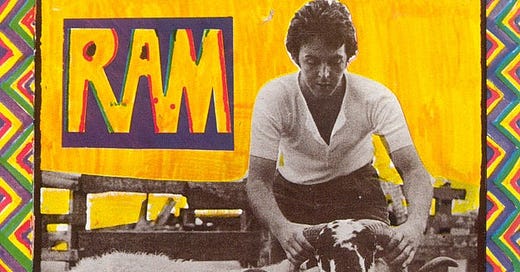We believe that we can't be wrong
Paul and Linda McCartney - 'The Back Seat of My Car' (Ram - 1971)
Whilst watching The Beatles’ Get Back documentary at the end of 2022, there was plenty of focus on the section where Paul McCartney wills ‘Get Back’ into existence. It is a remarkable portrait of a genius songwriter pulling at threads until he has yet another number-one hit on his hands.
As stunning as that moment is, one that surprised me was when McCa…
Keep reading with a 7-day free trial
Subscribe to The Run Out Grooves to keep reading this post and get 7 days of free access to the full post archives.




